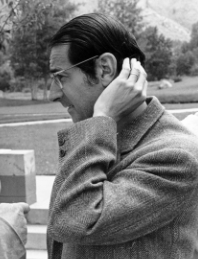Joseph Slater
(economist, deep state actor) | |
|---|---|
 | |
| Born | 1922 Salt Lake City, Utah, USA |
| Died | 2002 (Age 80) |
| Nationality | US |
| Alma mater | Berkeley |
| Spouse | Annelore Kremser |
| Member of | Bohemian Grove, Council on Foreign Relations/Historical Members, International Institute for Strategic Studies |
| Interests | • Marshall Plan • Ford Foundation • Peace Corps • Aspen Institute |
"Extremely well connected" US economist and deep state actor. Having important positions in post-war Germany and the Ford Foundation, he later attended the 1971 Bilderberg conference and became involved in the Club of Rome's no-growth globalist program. | |
Joseph E. Slater was a spooky "extremely well connected"[1] US economist and deep state actor. Having important positions in post-war Germany and the Ford Foundation, he later attended the 1971 Bilderberg conference and became involved in the Club of Rome's no-growth globalist program.
Contents
Early life
Slater was born in Salt Lake City in 1922. His family moved in high school to Palo Alto and he attended college at Berkeley where he won Phi Beta Kappa honors and joined the faculty as an instructor in economics.
World War II
During World War II, Slater joined the U.S. Navy and was posted to London, where he worked on plans for post-war Europe.
As hostilities drew to a close, he helped work on the Four Power Allied Control Council, which controlled Germany after its defeat. Slater was deputy United States secretary to the council until 1948, when he moved to the policy planning staff at the State Department to help form the United Nations.
Post war Germany
"When John J. McCloy was named United States high commissioner for Germany in 1949, Slater returned with him as secretary general of the Allied High Commission. In 1952, Slater moved to Paris, where he was executive secretary in the office of the United States representatives to NATO and the Organization for European Economic Cooperation, set up under the Marshall Plan.[2]
CIA fronts?
Slater returned from Europe in the 1950s and became the chief economist for Creole Petroleum, the Venezuelan subsidiary of Standard Oil. While at Creole Petroleum, Slater founded and served as the Executive Director of Fundación Creole, the "philanthropic" arm of the corporation. When leading the foundation, he proposed "the study of the possibilities of a radio and T.V. public service program designed for Venezuelan schools"[3].
In 1957 Slater joined the international affairs program of the Ford Foundation. During his time at the Ford Foundation, Slater was named the Secretary of President Eisenhower's Commission on Foreign Assistance, or the Draper Committee.[2]
With the election of John F. Kennedy he was named deputy assistant secretary of state for educational and cultural affairs where he wrote the blueprint for the Peace Corps.[2]
He headed the Salk Institute for Biological Studies from 1968 until 1972.[4][5]
Deep state networking
Slater became president and chief executive of the Aspen Institute for Humanistic Studies in 1969. In 1973, Slater opened a branch in Berlin (Aspen Germany). Slater also established Aspen France, Aspen Italy, Aspen Japan and Aspen South Korea.[2] In Germany an "important element of Slater’s mission was to bolster transatlantic support for liberal values, and to provide a compelling narrative to offset growing anti-American sentiments in Europe." It also was a place where according to Slater, "the Eastern leaders of various sorts could come, not just once, but to a series of meetings on major world issues."[6]
Under his direction, the Aspen Institute, which had been a comparatively small organization that specialized in educational seminars for executives, increased its range and scale, becoming a well-known meeting place for world leaders, scholars and scientists on international issues.[2]
According to Slater, "The Aspen Institute was involved with a number of the people of the Club of Rome as they were working on their report [The Limits to Growth]. For example, we had Jay Forrester, Aurelio Peccei and other people to discuss the character of planning systems and analyses of resources. We are concerned with many of the same elements and objectives as they were."[7]
Slater formed an international institute for environmental issues, The International Institute for Environmental Affairs (IIEA), later the IIED, which was established with money from Robert O. Anderson and Atlantic Richfield. Legally, the new organisation was independent from the Aspen Institute, but "a link on the policy level" was arranged through an interlocking directorate. The new organisation started to lobby governments and international agencies. A major theme was that national independence was contrary to the needs of the environment.[8]
In 1986 Slater helped found The John J. McCloy International Center at the Council on Foreign Relations[9], in honor of his mentor and former boss John J. McCloy.
Slater was part of the U.S. Association for the Club of Rome[10], and part of the 'dark age' network by Executive Intelligence Review, pushing "a single theme: modernization and industrial growth undermine the 'spiritual, nonmaterial' values" of societies.[11]
Event Participated in
| Event | Start | End | Location(s) | Description |
|---|---|---|---|---|
| Bilderberg/1971 | 23 April 1971 | 25 April 1971 | US Vermont Woodstock Woodstock Inn | The 20th Bilderberg, 89 guests |
References
- ↑ https://www.degruyter.com/document/doi/10.1525/9780520956599-016/pdf?licenseType=restricted
- ↑ a b c d e http://www.nytimes.com/2002/11/27/obituaries/27SLAT.html
- ↑ https://blogs.cul.columbia.edu/rbml/2022/08/29/processing-the-joseph-e-slater-papers/
- ↑ http://www.sfgate.com/bayarea/article/Joseph-E-Slater-aided-WWII-rebuilding-2749434.php
- ↑ https://www.dbnl.org/tekst/oltm003ongr01_01/oltm003ongr01_01_0071.php
- ↑ https://www.aspeninstitute.de/wp-content/uploads/Aspen-50-Years.pdf
- ↑ https://www.dbnl.org/tekst/oltm003ongr01_01/oltm003ongr01_01_0071.php
- ↑ https://mikaelnyberg.nu/wp-content/uploads/2015/02/The-Green-Capitalists.pdf
- ↑ https://www.cfr.org/john-j-mccloy-program-international-relations
- ↑ https://archivesspace.case.edu/repositories/4/archival_objects/61209
- ↑ https://larouchepub.com/eiw/public/1980/eirv07n27-19800715/eirv07n27-19800715_024-how_the_club_of_rome_planned_ira.pdf